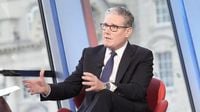As the Labour Party’s annual conference kicked off in Liverpool on September 28, 2025, the political spotlight shone fiercely on immigration, party unity, and the leadership of Prime Minister Sir Keir Starmer. The catalyst? Reform UK’s newly announced immigration policy, which would scrap indefinite leave to remain (ILR) for migrants, bar non-UK citizens from claiming benefits, and require those seeking UK citizenship to renounce other citizenships. The policy, unveiled by Nigel Farage’s party and exempting only EU citizens with settled status, has triggered a storm of condemnation and debate across the British political spectrum.
Sir Keir Starmer did not mince words. Speaking on the BBC’s Sunday with Laura Kuenssberg programme, he declared, “I do think it’s a racist policy, I do think it’s immoral – it needs to be called out for what it is.” He drew a sharp distinction between removing illegal migrants and targeting those who are lawfully present: “It is one thing to say we’re going to remove illegal migrants, people who have no right to be here. I’m up for that. It is a completely different thing to say we are going to reach in to people who are lawfully here and start removing them. They are our neighbours. They’re people who work in our economy. They are part of who we are. It will rip this country apart.”
Starmer’s comments came as the Labour conference opened amid a swirl of internal dissent, sliding poll numbers, and speculation about his future as party leader. According to Survation polling released at the start of the conference, 65% of Labour members believe the party is heading in the wrong direction, 64% think Starmer has performed badly since taking office, and 53% want a new leader before the next general election. The mood among Labour MPs and activists, as reported by the BBC’s political editor Chris Mason, is one of “broad and deep” grumpiness, with some backbenchers ruefully observing, “He makes Corbyn look loved.”
Despite this, Starmer struck a defiant tone, urging Labour to “unite and fight” against what he called “the threat from Reform.” He insisted that internal party squabbles and leadership speculation would only distract from the real battle: “There is a fight that we’re all in together, and every single member of our party and our movement, actually everyone who cares about what this country is, whether they vote Labour or otherwise. It’s the fight of our lives for who we are as a country, and we need to be in that fight, united not naval-gazing.”
Reform UK’s policy proposals, meanwhile, have stoked controversy and divided public opinion. The abolition of ILR would mean hundreds of thousands of legal migrants could face deportation or be forced to reapply for new, stricter visas. According to the BBC, a YouGov poll published on September 27, 2025, found that 58% of Britons oppose removing ILR from those who already hold it, though 44% support ending ILR as a policy for the future. The party’s head of policy, Zia Yusuf, fired back at Labour’s criticism on social media, stating: “Labour’s new message to the British electorate just dropped: ‘Pay hundreds of billions for foreign nationals to live off the state forever, or we’ll call you racist!’” He argued that Reform’s plan would “ensure only British people can access welfare and that migrants contribute to society.”
Labour, for its part, has also proposed changes to ILR, though not as sweeping or retrospective as those put forward by Reform. The party plans to double the period required to gain ILR from five to ten years, as part of a broader package to cut immigration. Home Secretary Shabana Mahmood has suggested tightening the rules around claiming ILR, but has maintained that legal migration is a “good thing” and that the UK has “always welcomed people who want to come and work here.”
The political debate has not been confined to immigration alone. The Labour conference has also seen renewed focus on housing, with Housing Secretary Steve Reed accusing the Conservatives of “crushing the dreams of families” by blocking access to affordable homes over the past 14 years. Reed pledged that Labour would “fight the Tory blockers and give working people the key to a decent home they can afford to live in,” announcing plans for a tranche of new towns in at least 12 locations. “We will once again build new towns with homes fit for families,” he promised, vowing to “restore the dream of home ownership to thousands of families right across our country.”
But for all the policy announcements and rhetoric, the conference has been overshadowed by questions about Labour’s direction and Starmer’s leadership. Labour chairwoman Anna Turley acknowledged that it had been “quite a challenging couple of weeks” for the party. Unite general secretary Sharon Graham warned that the upcoming Budget would be a “critical point” in determining whether the union would remain affiliated with Labour, citing concerns over the party’s economic direction and its approach to workers’ rights. “My members are scratching their heads and they’re asking, ‘how does a Labour Government allow two oil refineries to shut with absolutely no plan? How have we got a net zero plan that has workers at the end of the queue? Where is the plan for workers? Where is the transition? Where is the money?’” she told Sky News. Graham called for a loosening of fiscal rules, insisting, “Other countries are doing it. We should stop dancing around our handbag and do that.”
Meanwhile, Labour’s Ellie Reeves took aim at Reform UK, accusing the party of “importing failed Tories” to write its policies. “If the answer is Nadine Dorries, then you’re asking the wrong question,” she quipped at the conference.
Amid these domestic battles, Labour’s leadership also addressed international issues. Middle East minister Hamish Falconer spoke of “positive signs” towards a ceasefire in Gaza, while Foreign Secretary Yvette Cooper expressed hope that the world was “on the brink” of securing a peace deal for the region. These remarks were cautiously optimistic, reflecting the ongoing complexities of international diplomacy.
As the conference unfolded, Starmer sought to rally his party around a vision of justice and unity. In his opening speech, he celebrated the passage of the Hillsborough Law, calling it “an incredibly important moment for the 97, for Liverpool, but most of all, for the whole country.” He paid tribute to the families and campaigners who had fought for decades for justice after the 1989 stadium tragedy, emphasizing that “it’s not the Government that should be thanked, it’s not me that should be thanked. It’s the families and campaigners, who after such unimaginable loss, had almost every obstacle put in their path to get to justice.”
With the political stakes rising and the country’s future direction in question, the coming months will test both Labour’s resolve and the public’s appetite for change. For now, the battle lines are drawn: Labour, under Starmer’s embattled leadership, is determined to fight Reform UK’s divisive immigration agenda, even as it faces its own internal reckoning.



